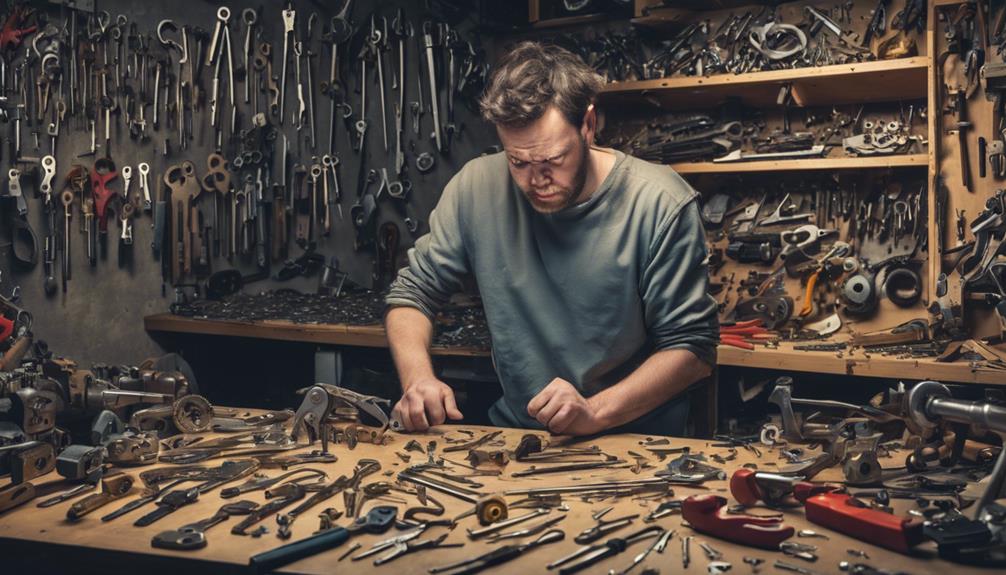You should avoid DIY lock re-keying when you're facing complex mechanisms or high-security locks. If you don't have experience with the right tools, you could damage the lock or compromise your security. Lost or stolen keys also necessitate careful consideration of risks—unauthorized access is a serious concern. Furthermore, DIY attempts might void warranties on your locks, leading to potential issues later. If you're trying to match multiple locks to a single key, or if you're in a rush, it's often best to leave it to professionals. There's plenty more to know about safe re-keying options for your peace of mind.
Key Takeaways
- Avoid DIY re-keying for complex or high-security locks that require specialized knowledge and tools to prevent security breaches and lock damage.
- Lack of experience and proper tools can lead to frustration, errors, and potential damage to locks during the re-keying process.
- Attempting DIY re-keying may void manufacturer warranties, risking your investment and compliance with warranty terms.
- If security risks arise from lost or stolen keys, professional assessment is essential for ensuring safety and preventing unauthorized access.
- Time constraints and urgency can lead to rushed, ineffective re-keying; hiring a locksmith provides peace of mind and efficient service.
Complex Lock Mechanisms
When it comes to re-keying locks, some complex lock mechanisms can be a real challenge. These intricate systems often involve a variety of pins and tumblers that work together to secure the lock, making the re-keying process more complicated than it may initially appear.
If you're considering DIY re-keying, it's essential to understand the risks involved. Complex locks often use intricate systems that require specialized knowledge and tools. When you attempt to rekey these locks without proper experience, you mightn't only waste time but also compromise your security.
Rekeying complex locks isn't just about swapping out pins; it involves understanding how the lock functions and how the internal mechanics impact the re-keying process. You could inadvertently damage the mechanism, leaving your home vulnerable. If you find yourself struggling or uncertain about the process, that's a clear sign it's time to hire a locksmith.
A professional locksmith has the expertise to handle complex locks efficiently and safely, ensuring your security isn't jeopardized. They can also offer insights into the best locking systems for your needs.
High-Security Locks
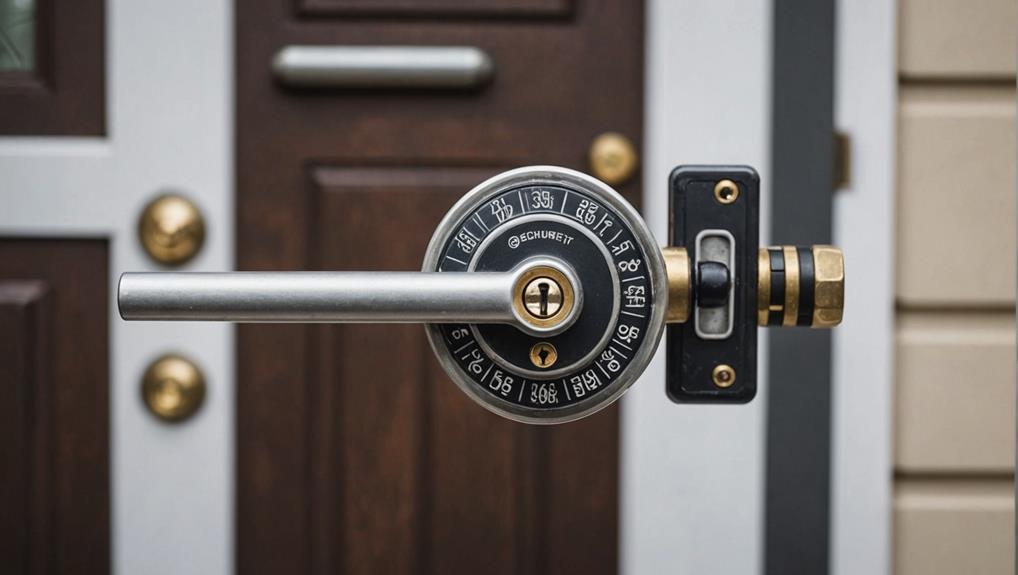
High-security locks are designed to provide an elevated level of protection against unauthorized access, making them a popular choice for both residential and commercial properties. However, when it comes to rekeying these locks, you should reflect twice before going the DIY route. The complexities involved in high-security locks can present significant challenges, and failing to address them properly can compromise your security.
Here's a quick comparison to reflect upon:
| Factor | DIY Rekeying |
|---|---|
| Skill Level Required | Moderate to High |
| Potential Risks | Lock damage, security breaches |
| Cost Implications | Saving money vs. possible losses |
When not to DIY rekey, remember that the risks associated with DIY vs. pro rekeying can outweigh the benefits. If you're dedicated to serving others by ensuring their safety, opting for a professional locksmith is often the best choice. They have the expertise to handle high-security locks, ensuring your property remains secure while saving you time and frustration. Investing in professional help ultimately protects you and those you care about.
Inexperienced With Tools

If you're inexperienced with tools, attempting to re-key a lock can quickly turn into a frustrating experience.
Understanding the right DIY re-keying kit for your lock type is essential, as you might lack the proper tools and not fully understand how lock mechanisms work, which can lead to mistakes.
Plus, there's a real risk of damaging your locks, making the situation worse instead of better.
Lack of Proper Tools
Re-keying a lock without the right tools can turn a straightforward task into a frustrating experience. If you lack the proper equipment, you may find yourself struggling with the process, wasting time, and potentially damaging the lock.
This not only hinders your ability to serve others but could also lead to increased costs if you need to call in a professional later on.
Using specialized tools designed for lock re-keying is essential for success. Without them, you mightn't be able to remove the cylinder or align the pins correctly.
Even if you think you can manage with makeshift tools, it's likely you'll encounter problems that could have been easily avoided.
Moreover, serving others means ensuring their safety and security. If you can't re-key a lock properly due to inadequate tools, you risk leaving someone vulnerable.
In such cases, it's better to admit your limitations and reach out for professional help. You'll not only save yourself a lot of frustration, but you'll also provide peace of mind to those who rely on you to keep their spaces secure.
Understanding Lock Mechanisms
Understanding the intricacies of lock mechanisms is essential, especially when you're inexperienced with tools. Each lock operates on specific principles, and recognizing these can make a significant difference in your ability to help others effectively.
Locks generally consist of pins, springs, and a cylinder that work together to secure a door. When you insert a key, it aligns the pins to allow the cylinder to turn, releasing the door.
If you don't fully grasp how these parts interact, attempting to re-key a lock could lead to frustration and potential issues for those relying on your assistance. The wrong technique or misunderstanding of how to manipulate these components can cause complications, leaving someone locked out or unable to secure their property.
Before you explore DIY lock re-keying, consider learning more about the specific locks you'll be dealing with. Familiarize yourself with their mechanisms and how they function.
This knowledge not only empowers you but also guarantees you can serve others effectively and safely. Remember, it's always better to seek professional guidance if you feel uncertain, ensuring you can truly help those who depend on you.
Risk of Damaging Locks
DIY lock re-keying can lead to significant damage, especially if you're inexperienced with tools. You might believe that tackling this task on your own will save time and money, but the risk of damaging your locks can outweigh those benefits.
When you don't fully understand how the internal mechanisms work, you might force components or misalign them, rendering your lock useless.
Imagine wanting to help a neighbor by re-keying their lock, only to discover that the damage you caused leaves them vulnerable. It's crucial to recognize that locks are intricate devices requiring precision and expertise.
If you lack the necessary tools or skills, you could inadvertently cause scratches, breaks, or misalignments that compromise the lock's integrity.
Instead of risking damage, consider reaching out to a professional locksmith who can provide the service you intended to offer.
By doing so, you not only guarantee the lock is handled correctly but also assure the safety and peace of mind for those you wish to serve.
Lost or Stolen Keys
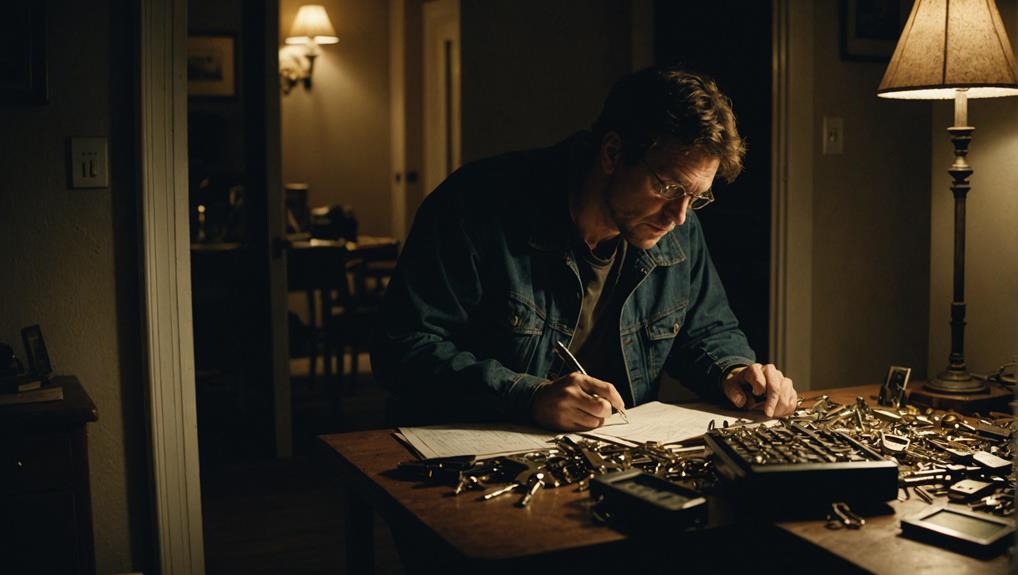
If you've lost your keys or had them stolen, it's crucial to assess the security risk right away.
In such situations, understanding the intricacies of lock re-keying can help you make a more informed decision.
You might think about re-keying the lock yourself, but it's often better to call in a professional.
They can guarantee your home stays secure and that you don't overlook any potential vulnerabilities.
Security Risk Assessment
Evaluating the security risks associated with lost or stolen keys is essential for maintaining your home's safety. When a key goes missing, it can leave you feeling vulnerable, not just for yourself but for those you care about. Understanding the potential threats can help you take proactive measures to protect your loved ones.
Here's a quick assessment of the risks to evaluate:
| Risk | Impact |
|---|---|
| Unauthorized Access | A thief may enter your home easily, putting your family at risk. |
| Lost Personal Items | If someone finds your key, they could access personal belongings. |
| Insurance Complications | Loss of keys may lead to denied claims if unauthorized access occurs. |
Professional Assistance Needed
When dealing with lost or stolen keys, seeking professional assistance is often the best course of action. You want to guarantee your home or business remains secure, and a professional locksmith can provide that peace of mind.
Here are three reasons why you should call in the experts:
- Expertise: Professionals know the ins and outs of various locking systems. They can quickly assess your situation and recommend the best solution to re-secure your property.
- Advanced Tools: A locksmith has the right tools to handle your locks safely and efficiently. Attempting a DIY fix might damage the lock or door, leading to more costly repairs.
- Security Assessment: Along with re-keying, a locksmith can evaluate your overall security. They'll identify vulnerabilities and suggest improvements to guarantee you're protected against future issues.
Warranty Considerations
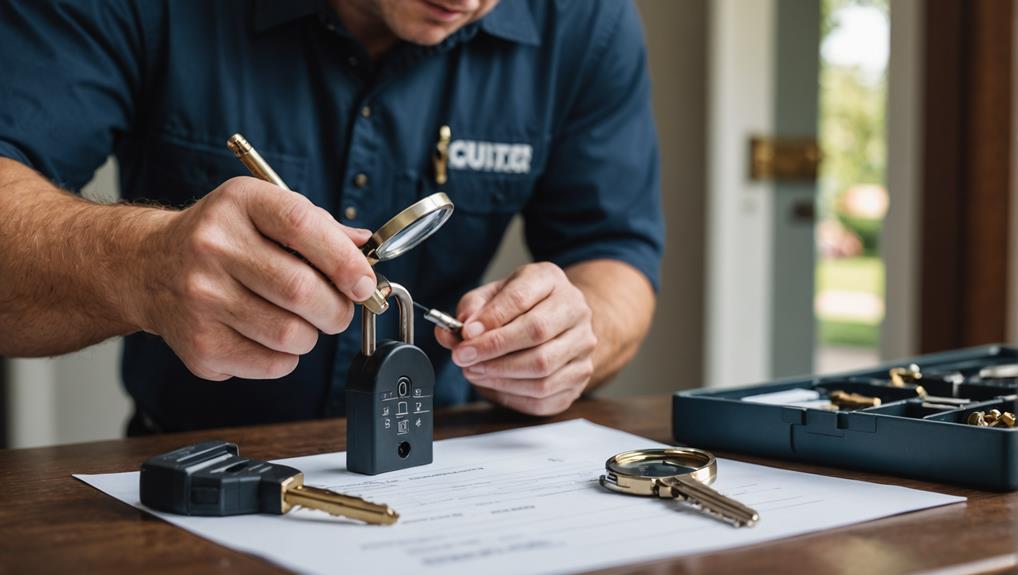
Lock re-keying may seem like a straightforward DIY task, but it can have significant implications for your warranty. Many lock manufacturers provide warranties that cover defects and issues related to the lock's performance. However, if you attempt to re-key the lock yourself, you might inadvertently void that warranty.
Manufacturers often stipulate that modifications or unauthorized repairs can lead to warranty cancellation. Before you immerse yourself in re-keying, take a moment to review the warranty terms for your lock. If the warranty specifies that only certified technicians can perform maintenance or modifications, you'll want to think twice about your DIY plans.
By choosing to handle the re-keying yourself, you could be sacrificing valuable protection for your investment. If you're committed to serving others, consider the implications of your choice. Opting for professional help not only guarantees compliance with warranty terms but also ensures that the job is done right.
You'll provide peace of mind for yourself and anyone relying on the security of your locks. In the end, investing in professional services is a way to uphold your integrity and commitment to safety.
Multiple Locks on One Key
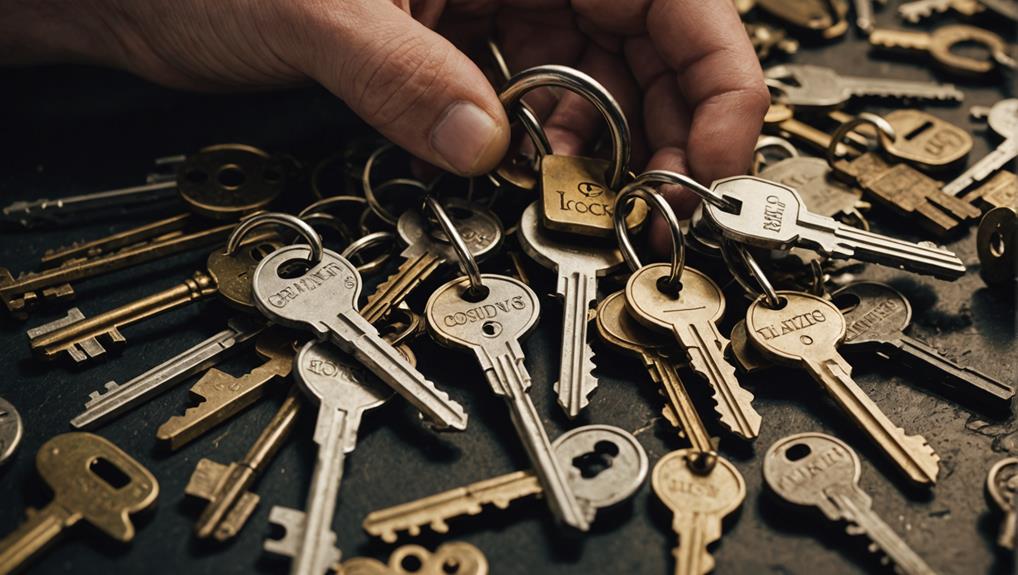
If you've ever wished for the convenience of using one key for multiple locks, you're not alone. Many people appreciate the ease of carrying just one key, especially when you're trying to serve others and simplify your life.
However, attempting to DIY re-keying for multiple locks can lead to complications. To maintain security effectively, it's crucial to understand the guidelines for determining frequency of re-keying commercial property locks.
Here's why you might want to think twice:
- Compatibility Issues: Not all locks can be re-keyed to work with the same key. You may end up frustrated if your locks don't match.
- Security Risks: DIY methods can compromise your security. If you don't know what you're doing, you could inadvertently create vulnerabilities that put your loved ones at risk.
- Time-Consuming: Re-keying multiple locks can take more time than you expect. If you're dedicated to helping others, you might find your time better spent on tasks that truly matter.
In the end, while the idea of having one key for multiple locks is appealing, it's worth considering the potential pitfalls.
Hiring a professional can guarantee you achieve that convenience without sacrificing security or peace of mind.
Time Constraints and Urgency
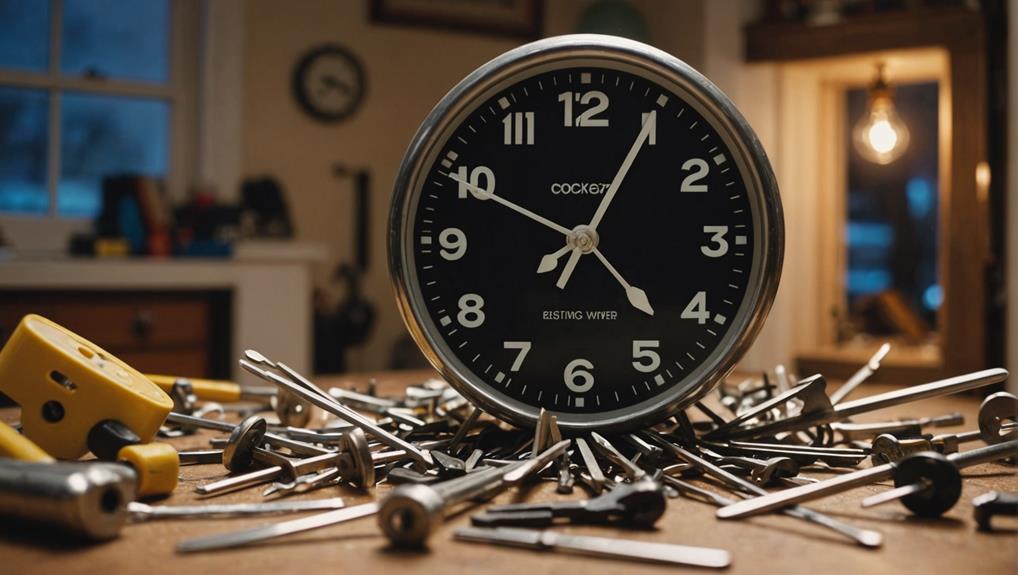
When you're pressed for time, it's essential to focus on what really matters—your safety and peace of mind.
Rushing through a re-keying job can result in improperly functioning locks, which could compromise your security. In such urgent situations, understanding the professional re-keying process can provide insight into the efficiency and reliability that a locksmith offers.
Instead of risking a botched job, consider calling a professional locksmith. They can efficiently handle the task without the stress and uncertainty that come with a DIY approach.
Plus, hiring a locksmith means you're supporting a local business that serves the community. You're not just getting the job done right; you're also investing in quality service.
Frequently Asked Questions
What Tools Are Necessary for DIY Lock Re-Keying?
To tackle DIY lock re-keying, you'll need a few essential tools.
Grab a re-keying kit specific to your lock brand, which usually includes different pins and a tool for removing the cylinder.
You'll also need a screwdriver, pliers, and possibly a flashlight for better visibility.
Having a small container for the pins helps keep everything organized.
With the right tools, you're ready to enhance your security and serve your home's needs effectively.
How Can I Determine My Lock's Complexity Level?
Determining your lock's complexity level isn't rocket science, but it can feel like it!
Start by examining the number of pins inside the lock; more pins usually mean a more complex design. Look for features like security ratings and additional mechanisms, too.
If it's got a fancy key shape or advanced technology, you're likely dealing with a high-security lock.
Trust your instincts—if it seems tricky, it might be best to ask a professional for help!
Are There Safety Risks Associated With DIY Re-Keying?
Yes, there are safety risks associated with DIY re-keying.
If you don't have the right tools or experience, you could compromise your lock's security. You might accidentally leave it vulnerable or even damage the lock, making it easier for intruders to break in.
Plus, if you're not sure about the process, you could end up locked out. It's often safer to consult a professional who can guarantee everything's done correctly.
What Should I Do if I Encounter a Jammed Lock?
When a lock jams, it can feel like a stubborn door refusing to open its secrets.
First, don't panic! Gently wiggle the key while applying light pressure.
If that doesn't work, spray a bit of lubricant to loosen things up.
If the lock still won't budge, consider calling a professional locksmith. They've got the tools and expertise to help, ensuring you and others stay safe and secure.
Your peace of mind matters!
Can I Re-Key a Lock Without the Original Key?
You can't re-key a lock without the original key in most cases. The original key is essential because it allows you to align the pins correctly for the new key to work.
If you've lost the original, consider contacting a locksmith. They can help you either by making a new key or replacing the lock entirely.
It's always better to guarantee your security rather than risk making the lock unusable.
Conclusion
When it comes to DIY lock re-keying, it's often better to leave it to the pros. If you're dealing with complex mechanisms, high-security locks, or just don't have the right tools, trying to fix it yourself can open a whole can of worms. Plus, if you've lost keys or are under time pressure, a professional can save you headaches down the line. Remember, sometimes it's worth spending a little extra to guarantee your security is in good hands.

